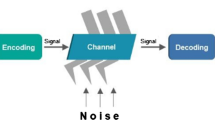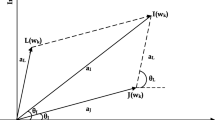Abstract
In this paper, noise variance is estimated from the noisy spectrum using the proposed noise estimation algorithm. In addition, the speech signal is enhanced by the modified modulation magnitude estimation (MMME)-based spectral subtraction algorithm. Chi-square distribution-based noise estimation algorithm is proposed in this work. During the speech presence period, the noise variance is estimated by recursively smoothing and averaging the noisy spectrum. The speech signal is then enhanced by estimating the modulation magnitude spectrum, which depends on a posterior SNR instead of a priori SNR. The optimal speech presence probability q m is found as 0.9, and simulations are carried out for this optimal value. Objective and subjective measures for the various noises are made and compared between the existing and proposed algorithms. From the experimental results, it is observed that the proposed noise estimation method comparably reduces mean square error (MSE) and LogErr to the earlier methods under various noise conditions with different input SNR levels. In addition, the proposed spectral subtraction method noticeably increases the dB value of peak signal to noise ratio, segmental SNR and segmental SNR improvement (ΔSNRseg) contrasting various existing spectral subtraction algorithms with the optimal q m value. Also, it improves the mean opinion score value and reduces the log spectral distance and MSE when compared to that of various existing ones. Hence, it reveals that the MMME-based spectral subtraction with proposed noise estimation algorithm reduces the speech distortion and residual noise as compared to existing methods.

Similar content being viewed by others
References
Boll S.: Suppression of acoustic noise in speech using spectral subtraction. IEEE Trans. Acoust. Speech Signal Process. 27(2), 113–120 (1979)
Martin R.: Noise power spectral density estimation based on optimal smoothing and minimum statistics. IEEE Trans. Speech Audio Process. 9(5), 504–512 (2001)
Martin, R.: Spectral subtraction based on minimum statistics. In: Proceedings of the 7th EUSIPCO’94, pp. 1182–1185 (1994)
Martin R.: Speech enhancement based on minimum mean-square error estimation and super-Gaussian priors. IEEE Trans. Speech Audio Process. 13(5), 845–856 (2005)
Cohen I.: Speech enhancement using a non causal a priori SNR estimator. IEEE Signal Process. Lett. 11(9), 725–728 (2004)
Cohen I.: Noise spectrum estimation in adverse environments: improved minima controlled recursive averaging. IEEE Trans. Speech Audio Process. 11(5), 466–475 (2003)
Cohen I.: Noise estimation by minima controlled recursive averaging for robust speech enhancement. IEEE Signal Process. Lett. 9(1), 12–15 (2002)
Cohen I., Berdugo B.: Speech enhancement for non- stationary noise environments. Speech Commun. 81(11), 2403–2418 (2001)
Kalamani, M.; Valarmathy, S.: Improved noise tracking algorithms for speech enhancement using LabVIEW. In: Proceedings of the IEEE 2nd ICACCI, pp. 1991–1996 (2013)
Erkelens J.S., Heusdens R.: Tracking of non-stationary noise based on data-driven recursive noise power estimation. IEEE Trans. Audio Speech Lang. Process. 16(6), 1112–1123 (2008)
Erkelens, J.S.; Heusdens, R.: Fast noise tracking based on recursive smoothing of MMSE noise power estimates. In: IEEE International Conference on Acoustics Speech and Signal Processing, pp. 4873–4876 (2008)
Rangachari S., Loizou P.C.: A noise-estimation algorithm for highly non-stationary environments. Speech Commun. 48, 220–231 (2006)
Rangachari, S.; Loizou, P.C.; Hu, Y.: A noise estimation algorithm with rapid adaptation for highly non-stationary environments. In: Proceedings of the IEEE ICASSP, pp. I-305–308 (2004)
Suhadi S., Last C., Fingscheidt T.: A data-driven approach to a priori SNR estimation. IEEE Trans. Audio Speech Lang. Process. 19(1), 186–195 (2011)
Scalart, P.; Filho, J.: Speech enhancement based on a priori signal to noise estimation. In: Proceedings of the IEEE ICASSP, pp. 629–632 (1996)
Gerkmann, T.; Hendriks, R.C.: Noise power estimation based on the probability of speech presence. In: IEEE Workshop on Applications of Signal Processing to Audio and Acoustics (2011)
Gerkmann T., Breithaupt C., Martin R.: Improved a posteriori speech presence probability estimation based on a likelihood ratio with fixed priors. IEEE Trans. Audio Speech Lang. Process. 16(5), 910–919 (2008)
Wang D., Lim J.: The unimportance of phase in speech enhancement. IEEE Trans. Acoustics Speech Signal Process. 30(4), 679–681 (1982)
Porter, J.; Boll, S.: Optimal estimators for spectral restoration of noisy speech. In: Proceedings of the IEEE ICASSP, pp. 53–56 (1984)
Sim B.L., Tong Y.C., Chang J., Tan C.T.: A parametric formulation of the generalized spectral subtraction method. IEEE Trans. Speech Audio Process. 6(4), 328–337 (1998)
Kamath, S.D.; Loizou, P.C.: A multi-band spectral subtraction method for enhancing speech corrupted by colored noise. In: Proceedings of the IEEE ICASSP, pp. 4164–4167 (2002)
Ghanbari, Y.; Karami-Mollaei, M.R.; Amelifard, B.: Improved multiband spectral subtraction method for speech enhancement. In: Proceedings of the 6th IASTED International Conference on Signal and Image Processing, pp. 225–230 (2004)
Ephraim Y., Malah D.: Speech enhancement using a minimum mean square error short-time spectral amplitude estimator. IEEE Trans. Acoust. Speech Signal Process. 32(6), 1109–1121 (1984)
Ephraim Y., Malah D.: Speech enhancement using a minimum mean-square error log-spectral amplitude estimator. IEEE Trans. Speech Audio Process. 33(2), 443–445 (1985)
Cappe O.: Elimination of the musical noise phenomenon with the Ephraim and Malah noise suppressor. IEEE Trans. Speech Audio Process. 2(2), 345–349 (1994)
Atlas, L.; Li, Q.; Thompson, J.: Homomorphic modulation spectra. In: Proceedings of the ICASSP, pp. 761–764 (2004)
Loizou P.C.: Speech enhancement based on perceptually motivated Bayesian estimators of the magnitude spectrum. IEEE Trans. Speech Audio Process. 13(5), 857–869 (2005)
Loizou P.C., Kim G.: Reasons why current speech-enhancement algorithms do not improve speech intelligibility and suggested solutions. IEEE Trans. Audio Speech Lang. Process. 19(1), 47–56 (2011)
Lu Y., Loizou P.C.: A geometric approach to spectral subtraction. Speech Commun. 50(6), 453–466 (2008)
Erkelens J.S., Jensen J., Heusdens R.: A data driven approach to optimized spectral speech enhancement methods for various error criteria. Speech Commun. 49(7&8), 530–541 (2007)
Paliwal K., Wójcicki K., Schwerin B.: Single-channel speech enhancement using spectral subtraction in the short-time modulation domain. Speech Commun. 52(5), 450–475 (2010)
Paliwal K., Schwerin B., Wójcicki K.: Role of modulation magnitude and phase spectrum towards speech intelligibility. Speech Commu. 53(3), 327–339 (2011)
Paliwal K., Wójcicki K.: Effect of analysis window duration on speech intelligibility. IEEE Signal Process. Lett. 15, 785–788 (2008)
Shannon, B.; Paliwal, K.: Role of phase estimation in speech enhancement. In: Proceedings of the International Conference on Spoken Language Processing, pp. 1423–1426 (2006)
So S., Paliwal K.: Modulation-domain Kalman filtering for single channel speech enhancement. Speech Commun. 53(6), 818–829 (2011)
Paliwal K., Schwerin B., Wójcicki K.: Speech enhancement using a minimum mean square error short time spectral modulation magnitude estimator. Speech Commun. 54(2), 282–305 (2012)
Author information
Authors and Affiliations
Corresponding author
Rights and permissions
About this article
Cite this article
Kalamani, M., Valarmathy, S. & Krishnamoorthi, M. Speech Enhancement Using Modified Modulation Magnitude Estimation-Based Spectral Subtraction Algorithm. Arab J Sci Eng 39, 8965–8978 (2014). https://doi.org/10.1007/s13369-014-1446-3
Received:
Accepted:
Published:
Issue Date:
DOI: https://doi.org/10.1007/s13369-014-1446-3




